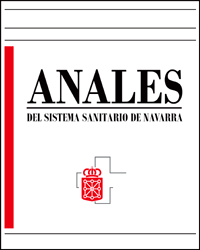La educación maternal en un centro de salud rural. Estudio de un grupo de mujeres gestantes
DOI:
https://doi.org/10.23938/ASSN.0683Palabras clave:
Gestante. Educación maternal.Resumen
El objetivo básico de la realización de este estudio es conocer el comportamiento y la actitud de un grupo de mujeres gestantes que recibe educación maternal en nuestro el Centro de Salud de Lesaka. Se trata es un estudio estadístico observacional y retrospectivo de la Educación Maternal y la Preparación para el Parto que se viene desarrollando ininterrumpidamente desde el año 1990. Material y métodos. El número de mujeres gestantes que han intervenido en este estudio es de 200, que corresponde al total de las que han recibido educación maternal en nuestro Centro durante los años 1991 a 1995. Los cambios en frecuencia de utilización de servicios y de tipo de lactancia se han analizado con los estadísticos Chi cuadrado y coeficientes de Pearsonís y Spearman. Resultados. La edad media de las embarazadas oscilaba entre los 24 y los 35 años. En 1991 el 82,1% de las mujeres utilizaba los servicios del tocólogo privado y el 17,9% utilizaba la asistencia pública. Durante 1992 se implantó un nuevo servicio de tocología en la zona básica y se modificó su uso en los años sucesivos al 50% aproximadamente (r=0,15; p=0,008). En 1991 la lactancia natural se iniciaba en el 68% de los recién nacidos y en 1995 lo hacia el 79%. Conclusiones. La educación maternal recibida por las madres es un buen instrumento para lograr el adecuado comportamiento para éstas con sus hijos.Descargas
Descargas
Publicado
Cómo citar
Número
Sección
Licencia
La revista Anales del Sistema Sanitario de Navarra es publicada por el Departamento de Salud del Gobierno de Navarra (España), quien conserva los derechos patrimoniales (copyright ) sobre el artículo publicado y favorece y permite la difusión del mismo bajo licencia Creative Commons Reconocimiento-CompartirIgual 4.0 Internacional (CC BY-SA 4.0). Esta licencia permite copiar, usar, difundir, transmitir y exponer públicamente el artículo, siempre que siempre que se cite la autoría y la publicación inicial en Anales del Sistema Sanitario de Navarra, y se distinga la existencia de esta licencia de uso.








